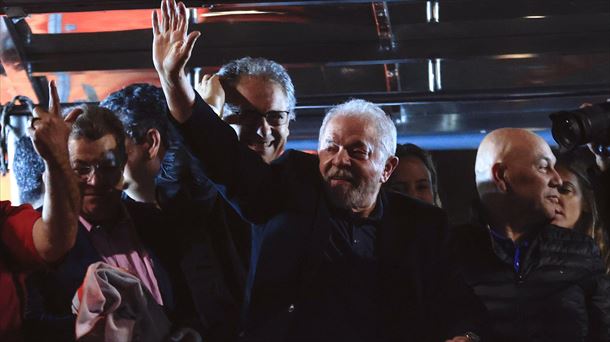Lula and Bolsonaro have three weeks ahead of them to dispute the vote of the 8% of the voters who supported the center-right Simone Tebet, the Labor Party member Ciro Gomes and a dozen candidates who did not exceed 1%.
Euskaraz irakurri: Brasilgo hauteskundeetako lehen itzuliaren gakoak: Bolsonarismoaren ezkutuko indarra eta abstentzioa
Brazil celebrated this Sunday the presidential election most polarized of its last decade. The ex-president Luiz Inacio Lula da Silva obtained 48.34% of the valid votes, compared to 43.28% of the president Jair Bolsonarowho aspires to his re-election.
Lula and Bolsonaro will meet in the second round
The election for the Presidency of Brazil It will be defined on October 30, after neither of the two candidates obtained more than 50% of the valid votes in the elections this Sunday.
Both candidates have three weeks ahead of them to contest the vote of 8% of the voters who supported the center-right Simone Tebet, the Labor Party member Ciro Gomes and a dozen candidates who did not exceed 1%.
The hidden force of Bolsonarism
Former President Luiz Inácio Lula da Silva won the elections, but the hidden force of President Jair Bolsonaro, which the polls did not detect in its full magnitude, has forced a now unpredictable second round.
The leader of the Brazilian extreme right, who aspires to his re-election, obtained a more favorable result than that projected by all the polls of voting intentions. Lula obtained only 5 percentage points more than his main antagonist.
The polls, however, until yesterday pointed to a difference between the two candidates of around 15 percentage points, since Bolsonaro did not exceed 36% of the valid votes in the demographic polls.

Jair Bolsonaro. Photo: EFE
Bolsonaro does not question the polls
After the results of this Sunday, Bolsonaro questioned the reliability of opinion polls, but remained silent on the legitimacy of the electronic polling system, which he has questioned on countless occasions.
The head of state has raised the specter of fraud against the country’s current electoral system and even asked Congress to introduce the printed vote, despite the fact that there has been no complaint against the electronic ballot box since its implementation in 1996.
Bolsonarismo flexes muscle
In addition to the good result of the former captain of the Army Reserve, Bolsonarism gave a show of strength this Sunday, after the election of important allies of the president both for Congress and for regional governments.
Some of his candidates won the governorships of important states, such as Rio de Janeiro, Brasilia and Paraná, in the first round, while his former minister Tarcísio Gomes de Freitas surprised by getting his ticket to the second round against Lula’s candidate, Fernando Haddad, in Sao Paulo, the largest electoral college in the country.

Luiz Inacio Lula da Silva. Photo: EFE
The highest abstention since 1998 and similar to that of 2018
Election day was also marked by abstention. The percentage of voters who did not appear at the polls in the first round of the presidential elections is the highest since 1998, according to data from the Superior Electoral Court (TSE).
Of the 156 million Brazilians called to the polls, 32.6 million did not appear, which represents an abstention of 20.94%, compared to 20.3% registered in 2018, when Bolsonaro was elected.
Source: Eitb
I’m Tifany Hawkins, a professional journalist with years of experience in news reporting. I currently work for a prominent news website and write articles for 24NewsReporters as an author. My primary focus is on economy-related stories, though I am also experienced in several other areas of journalism.
